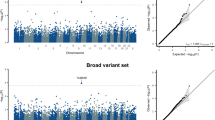Abstract
We found three new variations in the OX40 ligand (OX40L, CD134L) gene and its 5′ upstream region. −921 (G → A) at 5′ upstream region, −19 (C → G) at 5′ untranslated region, and 202+25 (G → T) at intron 2 were identified. −921 (G → A) and 202+25 (G → T) were detected in a substantial proportion of healthy Japanese individuals and were considered to be single nucleotide polymorphisms (SNPs). −19 (C → G) was detected in only one healthy individual. There was no association between these variations and the presence of rheumatoid arthritis (RA) or systemic lupus erythematosus (SLE).
This is a preview of subscription content, access via your institution
Access options
Subscribe to this journal
Receive 6 digital issues and online access to articles
$119.00 per year
only $19.83 per issue
Buy this article
- Purchase on Springer Link
- Instant access to full article PDF
Prices may be subject to local taxes which are calculated during checkout
Similar content being viewed by others
Author information
Authors and Affiliations
Corresponding author
Additional information
Sequence accession numbers: The nucleotide sequence data reported in this paper have been submitted to the DDBJ/EMBL/GenBank nucleotide sequence databases and assigned the accession numbers AB042986–AB042988. This study was supported by the Grant-in-Aid for Scientific Research (B) and Grant-in-Aid for Scientific Research on Priority Areas (C).
Rights and permissions
About this article
Cite this article
Hikami, K., Tsuchiya, N. & Tokunaga, K. New variations in human OX40 ligand (CD134L) gene. Genes Immun 1, 521–522 (2000). https://doi.org/10.1038/sj.gene.6363709
Published:
Issue Date:
DOI: https://doi.org/10.1038/sj.gene.6363709



